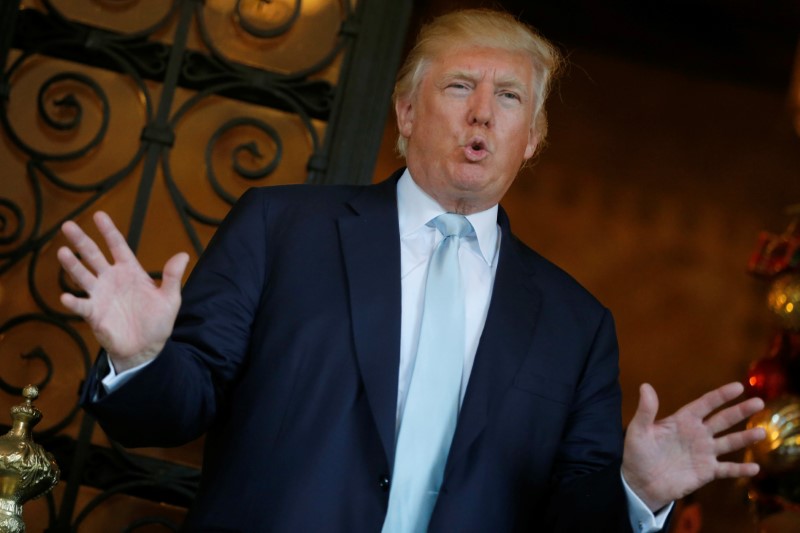(Bloomberg) -- Donald Trump says his corporate tax cuts are setting off a domino effect that will finally end the long, lean years for American wage-earners.
More than a million workers at companies from AT&T Inc (NYSE:T). to Comcast Corp (NASDAQ:CMCSA). already got their payout, the president said this week. There’s more to come, Trump said, because “the ones that didn’t get it, everyone is saying, ‘Where’s mine?’ So they’re all going to have it.’’
That would be a big deal for the economy and for markets. Lackluster pay has been a weak point of America’s recovery after the Great Recession, helping to keep inflation below the Federal Reserve’s target rate, and bond yields at historically low levels.
Some of the top names in fixed-income investing are starting to call the end of that decades-long rally -- citing Trump’s tax-cuts among the factors. The case gets a boost every time a corporate employer raises pay, and this week the biggest of them all did exactly that: Wal-Mart Stores Inc. (NYSE:WMT) increased starting hourly rates and handed out bonuses. Late Thursday, Fiat Chrysler Automobiles NV (NYSE:FCAU) joined the party.
But a tale out of another giant company, Pfizer Inc. (NYSE:PFE), illustrates why it may be too early to predict a wage bonanza.
Hours after Trump signed the tax law, Pfizer Chief Executive Officer Ian Read wrote to about 100,000 employees and contractors. He hailed a landmark measure that would galvanize American business. Read’s memo made no mention of higher salaries or bonuses, though, and the company hasn’t announced any such plans.
That didn’t sit well with one woman working for the drugmaker as a contractor in Chicago. She didn’t exactly ask the Trump question, “where’s mine?’’ But it was late and she was annoyed by Read’s message, so she responded with a salty one of her own. Why, she asked, was the boss sharing his jubilation at all the benefits the company was set to reap -- when none of them might trickle down to its workers?
Not only did she not get a raise -- she was tossed off the contract.
‘Unprofessional Language’
Her “assignment was ended solely because of the use of inappropriate and unprofessional language,” Pfizer spokeswoman Joan Campion said. The contractor asked not to be identified by name, saying she didn’t want to lose out on future jobs because of the episode.
Pfizer is evaluating how to use its tax gains “on behalf of all stakeholders,’’ Campion said when asked about pay and bonuses. “Our compensation is driven by performance, not legislation, and is set at a competitive level.’’
That’s a key part of the case that Trump’s tax bill won’t be a game-changer in labor markets. Corporate profits will rise -- but they’ve been elevated, by historical standards, for several years already, and workers haven’t seen big benefits. Some companies were doubtless planning pay raises anyway. But whatever was a competitive wage before the cuts, in employers’ eyes, will remain one afterwards.
‘Because I Have To’
Or, as Philadelphia Fed President Patrick Harker expressed it last week, putting himself in a CEO’s shoes: “At the end of the day, I’m going to raise wages because I have to, not because I want to.”
Of course, that could happen. There are plenty of economists, including Jan Hatzius at Goldman Sachs (NYSE:GS), who do expect broad wage acceleration as companies compete for scarce workers. In the takeoff camp’s favor is an unemployment rate that looks poised to drop below 4 percent for the first time since 2000.
There are signs, post-tax-bill, that “firms are starting to be a little more generous,” said Stephen Stanley, chief economist at Amherst Pierpont Securities in New York.
For those who doubt that 2018 is the year pay will finally pick up, employment is a more important benchmark than unemployment.
The jobless rate may be near the lows it reached at the end of the 1990s boom – but that’s partly because many Americans have given up on job-seeking. The share of the working-age population that’s actually in work hasn’t recovered to the level it reached before the Great Recession, let alone its 2000 peak -- leaving a pool of labor on the sidelines.
Anecdotes also suggest that businesses are turning to non-wage compensation, like benefits or flexible work schedules, to avoid increasing base pay.
Cash to Shareholders
Many companies say they’ll hand any additional cash from the tax cut not to employees but to shareholders, through dividends and buybacks -- or spend it on acquisitions, which often result in job cuts.
Cardinal Health Inc (NYSE:CAH)., the drug distributor, will “look at strategic M&A opportunities and we’ll return cash to shareholders,’’ Chief Financial Officer George Gomez told investors in San Francisco this week. Pfizer’s CFO, Frank D’Amelio, was asked in an October call how the company might use extra funds from the tax measures. He listed its capital allocation priorities: “dividends, share buybacks, investing in the business, and M&A.’’
That’s one reason Democrats and other critics have labeled Trump’s tax bill a corporate giveaway. Defenders point out that some of the cash will be used to expand operations and create jobs, while the portion that goes into stock markets benefits the millions of Americans who have retirement funds.
Wait Forever?
There are also millions who don’t. And they’ve had to struggle through through a bear market for U.S. labor that’s even older than the bull market for bonds.
There have been bright interludes such as the late-’90s boom, but essentially the so-called labor share -- the chunk of American economic output that goes to workers in the form of wages and salaries -- has been in steady decline since the 1970s. Whatever the impact of Trump’s tax bill, expecting it to turn such long-term trends around would be a bold prediction.
“If you’re waiting for a 1970s-style breakout in wages or prices,’’ said Stanley, the Amherst Pierpont economist, “I don’t think you’re ever going to see it.”
